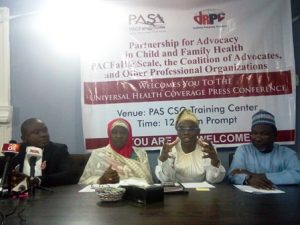
For Nigeria to achieve universal health coverage, a coalition of Civil Society Organizations and Other Professional Associations in the Partnership for Advocacy in Child and Family Health at Scale, PACFaH@Scale, has highlighted what should be done by tiers of government in the country and the citizenry.
Addressing newsmen on Monday December 10 in Abuja to mark the 2018 international universal health coverage day, the group said increased investments should be made by all tiers of government in the country into the health sector.
The coalition, which spoke through Co-Chair, Open Government Partnership, Kano State and Executive Director, Women in Media, Hajiya Halima Umar, said the tiers of government should prioritize the second National Strategic Health Development Plan (NSHDP II) and ensure accountability in its implementation.
Umar urged the federal Government to release the Basic Health Care Provision Fund in 2018 health budget without further delay.
The coalition also wants government to explore innovative ways to fund the health system in order to achieve universal health coverage.
“An example of such innovation would be introduction of mobile phone tax that will involve charging one kobo per second on every outgoing mobile phone call in Nigeria,” the group said.
The coalition explained through some of its members such as Secretary-General, Network of Nigeria NGOs, Barrister Ayo Adebusoye and Vice-President, Society of Gnaecologists and Obstetrics of Nigeria, Dr Habib Sadauki, that charging money on calls was just a proposal that could be subjected to superior innovations from the public and government.
Speaking further on the theme of the Universal Health Coverage Day: “Unite for universal health coverage: now is the time for collective action,” Mrs Umar (who spoke on behalf of the coalition) said universal health coverage means that all Nigerians get quality health services where and when needed without suffering financial hardship.
She noted further: “Prior to the global movement of UHC, Nigeria developed health policies and structures such as the first National Strategic Health Development Plan (NSHDP-I) and the national Health Insurance Scheme (NHIS) to increase access to healthcare, but despite these structures, the country was unable to achieve the objective of ensuring that every citizen has access to healthcare.
“According to Nigeria’s National Health Account 2014, for every N1,000 spent on health, about N700 is out-of-pocket expenditure, a situation that is driving millions of Nigerians into poverty and denying them basic healthcare. Also, in 2001, following Abuja declaration, Nigeria signed to commit at least 15 percent of her annual budget to improve the health sector, but in the last two decades, the highest federal budgetary allocation to health stands at seven percent. With such under-investment in healthcare, Nigeria cannot achieve universal health coverage.
“The meagre investment is further compounded by delay or non-release of funds appropriated. Even when funds are released, there are challenges of utilization and accountability. Other lingering barriers to UHC in in the country include low political will to adequately fund healthcare, poor governance, mismanagement of resources and lack of coordination among federal, states and local governments.
“The coalition believes that if these barriers are removed by fully funding, implementing and ensuring accountability of the NSHDP-II, every Nigerian will have access to affordable and quality health care.
The briefing rounded off a two-day workshop that provided the PACFaH@Scale CSO the opportunity to learn more about universal health coverage, and it provided participants to reflect on the progress and barriers towards its attainment in Nigeria,” Umar said.

